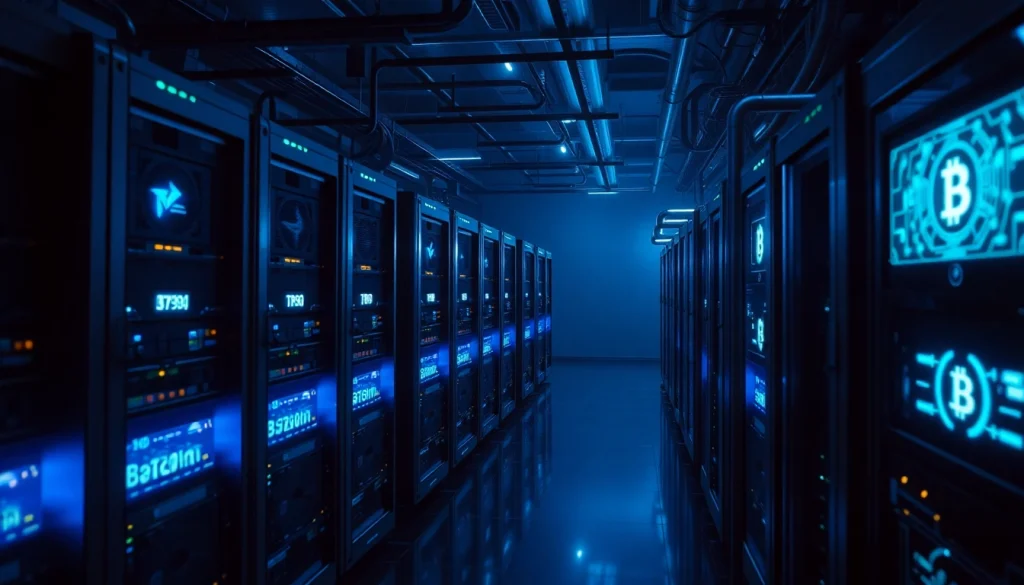
Understanding Bitcoin Mining: The Basics
What is Bitcoin Mining?
Bitcoin mining is a critical process that enables the Bitcoin network to operate efficiently and securely. In essence, it is the method used to validate transactions and add them to the public ledger known as the blockchain. Miners use high-powered computers to solve complex mathematical problems that validate transactions, and in return, they are rewarded with newly created bitcoins. This process not only secures the network but also ensures that transactions are processed fairly and transparently.
At its core, Bitcoin mining serves a dual purpose: it facilitates the introduction of new bitcoins into circulation and provides a way to confirm and record transactions on the blockchain. By decentralizing the transaction-verification process, Bitcoin achieves its goal of a trustless digital currency where no single entity has control.
How Bitcoin Mining Works
The mining process involves several steps that work together to maintain the integrity of the Bitcoin network. Initially, miners gather transactions waiting to be confirmed from the Bitcoin network. These transactions are grouped into a block. Each block contains a cryptographic hash of the previous block, linking them securely and forming a long chain, hence the term ‘blockchain.’
Once a miner forms a new block, they must compete with others to solve a unique mathematical challenge generated by the Bitcoin protocol. This challenge requires extensive computational power and is known as finding a ‘nonce’ (a number used once). The first miner to solve this equation gets to add the block to the blockchain and earns a block reward, which currently stands at 6.25 bitcoins per block, although this reward halves approximately every four years in an event known as ‘halving.’
The Importance of Bitcoin Mining in the Network
Bitcoin mining is integral to the security and functioning of the Bitcoin network. Each time a miner successfully adds a block to the blockchain, they verify and confirm the legitimacy of transactions. This process prevents double spending, where an individual could attempt to use the same bitcoin for different transactions simultaneously. Through mining, the integrity of the network is maintained, and users can trust that their transactions are secure.
Additionally, mining acts as a defense mechanism against potential attacks. The decentralized nature of mining means that altering transaction history would require an enormous amount of computational power, effectively deterring fraud and manipulation. Hence, mining not only produces new bitcoins but also reinforces the overall security of the network.
The Tools of the Trade: Mining Equipment
Essential Hardware for Bitcoin Mining
The choice of hardware is paramount for successful Bitcoin mining. Historically, miners began using standard CPUs to mine Bitcoin. However, with increased competition and greater mining difficulty, the landscape evolved.
Today, the most effective miners employ dedicated hardware known as Application-Specific Integrated Circuits (ASICs), which are specifically designed for the purpose of mining cryptocurrencies. These devices offer significantly higher hashing power compared to traditional hardware, improving the chances of solving blocks efficiently and maximizing profitability.
It is not just about the hardware; power efficiency is a critical consideration as electricity is one of the most significant expenses in mining operations. Miners need to find a balance between performance and energy consumption to ensure profitability.
Software Solutions for Mining
While hardware is fundamental, the software used for mining is equally important. Mining software connects miners’ hardware to the Bitcoin network, enabling them to contribute to the mining process. Popular mining software includes CGMiner, BFGMiner, and EasyMiner, each catering to different hardware configurations and user experience levels.
Additionally, miners often use monitoring software to track their performance and manage their operations effectively. This software helps miners optimize their settings, evaluate power consumption, and monitor temperature levels to prevent overheating.
Choosing the Right Mining Pool
Given the increasing difficulty of mining Bitcoin, many miners join mining pools to combine resources and increase their chances of earning rewards. A mining pool is a collective of miners who work together to solve blocks and share the rewards based on contributed computational power.
When selecting a mining pool, miners should consider several factors, including the pool’s size, fee structure, payout methods, and reputation within the community. Popular pools like F2Pool, Poolin, and Slush Pool offer distinct advantages, but miners should conduct thorough research to find the best fit for their individual needs.
Bitcoin Mining Techniques: From Novice to Pro
Solo vs. Pool Mining: What You Need to Know
In the world of Bitcoin mining, there are generally two approaches: solo mining and pool mining. Solo mining involves an individual miner attempting to solve blocks independently. While this method can lead to higher rewards if successful, it is also highly competitive and may require substantial investment in hardware and electricity.
On the other hand, pool mining reduces the probability of failure by allowing miners to share resources and rewards. Each miner’s contributions are pooled together to increase the overall computational power available. This method provides more consistent rewards, albeit smaller, as they are split among all participants in the pool.
Cloud Mining: Advantages and Disadvantages
Cloud mining is an alternative method of Bitcoin mining that allows individuals to rent mining power from a third-party provider. This approach eliminates the need for hefty hardware investments and the complexities associated with setting up and maintaining mining rigs.
However, cloud mining is not without its risks. Miners must be wary of potential scams and ensure that they choose reputable providers. Additionally, the profitability of cloud mining can sometimes be less predictable than traditional methods, making careful analysis necessary before committing funds.
Optimizing Your Setup for Maximum Efficiency
When it comes to Bitcoin mining, efficiency is key. Miners should prioritize optimizing their setups to minimize energy costs while maximizing hashing power. This can involve overclocking hardware, conducting regular maintenance checks to keep equipment running smoothly, and finding ways to improve cooling systems to prevent overheating.
Furthermore, miners should regularly monitor their performance metrics using mining software. This not only provides valuable insights into energy consumption but also identifies opportunities for cost reductions and performance enhancements, ensuring that their mining ventures remain profitable.
Common Challenges in Bitcoin Mining
Electricity Costs: Understanding Expenses
Electricity is by far one of the largest expenses that miners must tackle. The energy-intensive nature of mining operations means that without a reliable and cost-effective source of electricity, profitability can quickly diminish.
Miners should investigate different energy sources and pricing plans offered in their regions. Some may consider relocating to areas with lower electricity costs or investing in renewable energy solutions such as solar or wind to reduce long-term operational costs.
Difficulty Adjustment: What It Means for Miners
The Bitcoin protocol adjusts the difficulty of mining approximately every two weeks based on the total computing power in the network. As more miners join the network, the difficulty increases, posing a challenge to maintaining profitability.
This means that miners must continually adapt to the evolving landscape. Staying updated on network conditions is crucial, as being aware of these changes allows miners to make informed decisions on whether to continue mining or adjust their strategies accordingly.
Keeping Your Equipment Cool and Efficient
Heat management is an often-overlooked factor in Bitcoin mining. Excessive heat can significantly reduce the lifespan and performance of mining rigs. Implementing effective cooling systems is vital, with common solutions including fans, liquid cooling, or even immersion cooling for larger operations.
Maintaining optimal operating temperatures not only preserves equipment but can also enhance overall hashing performance, thereby improving revenue generation.
The Future of Bitcoin Mining
Influence of Regulations on Mining
As cryptocurrencies and bitcoin mining grow in popularity, governments around the world are beginning to take notice, leading to an evolving regulatory environment. Changes in regulations can dictate the legality of mining operations, taxation levels, and even the use of energy resources.
Miners must stay informed about the legal landscape in their countries to ensure compliance and maintain operational stability. Understanding upcoming regulations can also provide advance insights into potential opportunities or threats in the mining space.
The Role of Renewable Energy in Mining
The increasing awareness of environmental concerns surrounding bitcoin mining has prompted a shift towards renewable energy sources. Mining operations powered by solar, wind, and hydroelectric energy can drastically lower carbon footprints and long-term operational costs.
As the world of cryptocurrencies continues to evolve, miners who embrace sustainable practices may not only enhance their market image but could also benefit from financial incentives or lower energy prices, positioning themselves favorably in the competitive landscape.
Predictions for Bitcoin Mining Trends
As technology advances and the cryptocurrency market matures, various trends will likely redefine Bitcoin mining. Innovations in hardware design and software efficiency could lead to even more powerful mining rigs with lower energy consumption. Additionally, the potential integration of artificial intelligence to optimize mining operations is on the horizon.
Furthermore, the global transition towards sustainable energy sources will play a pivotal role in shaping the future of bitcoin mining. Miners who proactively adapt to these trends will not only ensure the longevity of their operations but also contribute positively to the environmental impact of the industry.





